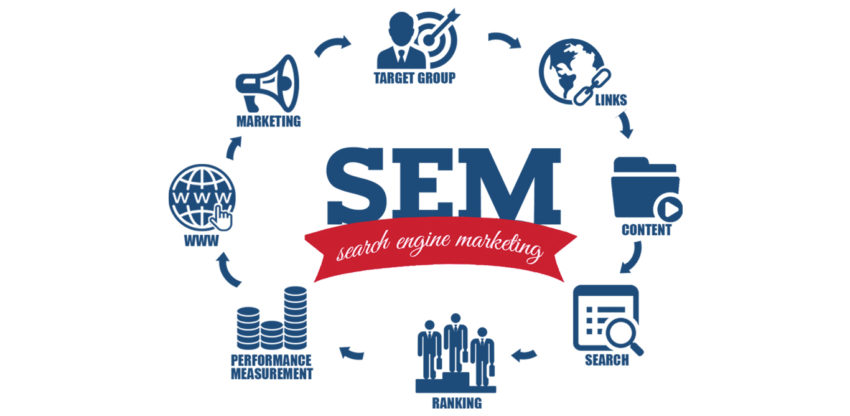What is SEM – Search Engine Marketing?
Search Engine Marketing is a form of online marketing that involves the use of search engine results pages to promote business websites.
Search Engine Marketing is about all marketing activities that use search engine technology for marketing purposes.
It involves the placement of targeted advertisements in a user’s search engine results. Your paid ads will be only visible to users who meet certain locations and demographic criteria.
You only pay when visitors click on your ads. Search Engine Marketing advertising is one of today’s most effective marketing strategies.
Your bid price is not based entirely on the bid price, but also ad relevancy, click-through rate, and the ad copy.
Search Engine Marketing is the practice of marketing business using paid advertisements that appear on search engine results pages (SERP).
If your goal is awareness and showing your ad to people, then focus on Cost Per Mile / Impression (CPM).
If your priority is website traffic, Cost Per Click (CPC) is the best metric.
You can use Cost Per Acquisition (CPA) to optimize the campaign based on actual conversions if your goal is to increase leads or transactions.
Google AdWords Networks –
Google Search Network & Google Display Network.
First – Google Search Network consists exclusively of search-related websites owned by Google.
Second – Google Display Network includes such as YouTube, Blogger, and Gmail. Bing Ads allows customers to buy ads on both Yahoo’s network of websites and Bing’s network.
First Plan of Search Engine Marketing –
# Keywords – a user’s intention, what they are looking for.
# Ads – a promise to the user for that intention.
# Landing Pages – a delivery of promise.
Key Metrics of Search Engine Marketing –
# Reach – It is defined by the number of peoples who viewed your advertisement. A number of people that visit any search engine you are planning to use.
# Bounce Rate – It is a percentage of visits that go only to one page before exiting the site. When visitors come to your site, and they found that what they saw on the advertised page is not relevant to them.
It is a parameter for the relevancy of the content on the page.
# Click Through Rate – It refers to the probability of a user clicking on your ads. This is a benchmark for an advertisement or a campaign.
# Conversion Rate – It will tell you the percentage of the people clicking through an ad ended up in advertiser desire.
# Return on Investment – A cost is always involved to achieve a goal. ROI is a value that will be obtained against every spent.
There are millions of potential customers who are searching for products and services every day, paying for placement in search engines can make sense.
Types of Paid Ads in Search Engine Marketing –
# Pay Per Click – When a potential customer searches, Google display results (SEO) and Ads (PPC) from businesses that are relevant to the query.
Pay per click (PPC) campaigns are extremely effective tools. PPC is controllable and it is all about tracking and accuracy and can lead to great results.
# Banner & Display Ads – This type of advertising is most commonly seen on a website as a banner or pop-up ads. These are seen on websites, and mobile apps.
It can feature interactive formats of images or even animations to engage users. Publishers and advertisers only profit when a visitor clicks on that ad.
A graphic-based call to action can prompt customers to buy, inquire, and click-through. With a talented mix of search engine marketing and graphic designers, you can run any banner based campaign.
# Video – It is done by customizing your ad placement; to a specific geographical location; or when someone is watching a related video on YouTube. Video advertising, like ads on YouTube, are fantastic ways of engaging with customers.
SEM can boost top of mind brand and unaided brand awareness by putting your brand in front of prospective customers even when they don’t associate with a product/service.
If you are a new organization with a young online profile or established business whose customers rely on search. Search engine marketing is becoming a significant driver of business and market share expansion.
Imp. Points in SEM Campaign –
- Return on Investment (ROI)
- Measurable Results
- Flexible Budget
- Website Traffic (Instant)
- Highly Targeted
- Develop an SEM campaign audience through an evolution of your target market and analysis of geographic search volume.
- SEM campaign strategy that provides an overview of your campaign focus and parameters.
- Create Text & Graphic Ads targeting your market and perform A/B ad testing, keyword evolution, and volume.
Search Engine Marketing is good for any organization:-
- If they need to reach the top of the search engine immediately.
- They need to target keywords that you can’t rank organically.
- They want to specifically target users surrounding a specific geographic location.
- An organization wants to display advertisements specifically to users who visited your site.
Conclusion – Search Engine Optimization is not the complete answer; a company should have a solid PPC strategy as well. SEM can provide companies with an outstanding Return on Investment (ROI).
